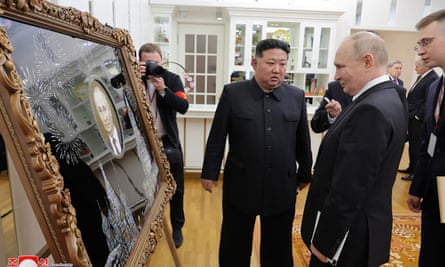North Koreans deployed alongside Russian troops in Ukraine, sources say
Engineers said to be supporting missile launches and reports of North Koreans killed near Donetsk
Emma Graham-Harrison in Kyiv and Justin McCurryThu 10 Oct 2024 05.40 EDTLast modified on Thu 10 Oct 2024 12.12 EDTShareNorth Korean military engineers have been deployed to help Russia target Ukraine with ballistic missiles, and fighters operating in occupied areas of the country have already been killed, senior officials in Kyiv and Seoul said.
There are dozens of North Koreans behind Russian lines, in teams that “support launcher systems for KN-23 missiles”, a source in Ukraine told the Guardian.
Kim Jong-un, the North Korean leader, last year travelled to Russia for a summit with Vladimir Putin where the two men bolstered their deepening ties with a secret arms deal.
Pyongyang’s ammunition shipments were vital in allowing Russian forces to advance in a grinding war of attrition in eastern Ukraine this summer. But it appears increasingly clear that the agreement went beyond supplying materiel.
North Koreans were among the dead after a Ukrainian missile strike on Russian-occupied territory near Donetsk last week, South Korean and Ukrainian officials said. It was not clear if they were military engineers or other forces.
Russia and North Korea: what can they do for each other?Read moreForeigners have fought as mercenaries for Russia, but if North Koreans are on the ground it would mark the first time a foreign government has sent troops in uniform to support Moscow’s war.
South Korea’s defence minister, Kim Yong-hyun, told MPs in Seoul this week that it was “highly likely” that North Korean officers had been deployed to fight alongside Russians, and several had died in the attack, although he did not give further details.
Andriy Kovalenko, the head of Ukraine’s Centre for Countering Disinformation, said in a post on Telegram that some North Koreans had been killed in Russia. His organisation is part of the national security and defence council.
On Wednesday the Ukrainian military said they had destroyed North Korean ammunition in a strike on a depot in the Bryansk region, 75 miles (120 km) from the Ukrainian border.
 View image in fullscreenKim Jong-un presents a gift to Vladimir Putin at the Kumsusan state guesthouse in Pyongyang in June. Photograph: KCNA via KNS/AFP/Getty ImagesJoining the war on Ukraine gives North Korea a chance to test weapons, gain combat experience for its troops and bolster its standing with a powerful international ally.
View image in fullscreenKim Jong-un presents a gift to Vladimir Putin at the Kumsusan state guesthouse in Pyongyang in June. Photograph: KCNA via KNS/AFP/Getty ImagesJoining the war on Ukraine gives North Korea a chance to test weapons, gain combat experience for its troops and bolster its standing with a powerful international ally.
“For North Korea, which has supplied Russia with many shells and missiles, it’s crucial to learn how to handle different weapons and gain real-world combat experience,” Lim Eul-chul, a professor at the Institute for Far Eastern Studies in Seoul, told the AFP news agency. “This might even be a driving factor behind sending North Korean soldiers – to provide them with diverse experiences and wartime training.”
North Korean missiles and shells are of poor quality and unreliable but have been key to keeping Russian guns firing relentlessly on Ukraine’s better-trained and motivated army.
Pyongyang is estimated to have provided around half the larger-calibre ammunition used on the battlefield this year, more than 2m rounds, a Ukrainian source said. It also provided KN-23 missiles, which were used in dozens of strikes across Ukraine last winter, Ukrainian media reported. After a pause of several months, they were deployed again from July.
The KN-23 is a short-range ballistic missile that was first tested in 2019 and has been compared to Russia’s Iskander-M missiles. It is thought to have a range of about 280 miles when carrying a 500kg warhead.
Moscow and Pyongyang have denied weapons sales even as they have publicly celebrated deepening ties in recent months. The Kremlin on Thursday dismissed North Korean troop deployments in Ukraine as “another bit of fake news”.
Kim described Putin as his “closest comrade” in a birthday message sent this week, and Putin made a state visit to North Korea in June during which the leaders signed a mutual aid agreement.
In return for its missiles and other military hardware, North Korea is thought to be seeking Russian help with its spy satellite programme, which has had embarrassing failures over the past two years.
It is not clear how far Russia is willing to go in sharing sensitive military technology with North Korea in return for continued support in Ukraine.
Pyongyang, after decades of UN-led sanctions targeting its ballistic missile and nuclear weapons programmes, is attempting to strengthen its ties with Russia and China as part of an alliance against “western hegemony and imperialism”.
The strategy paid dividends in March when Russia used its veto in the UN security council to in effect end UN monitoring of sanctions violations, a move publicly welcomed by Pyongyang.
Artem Mazhulin contributed to this report.
